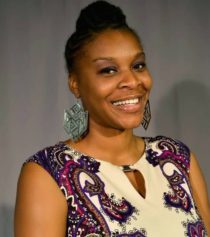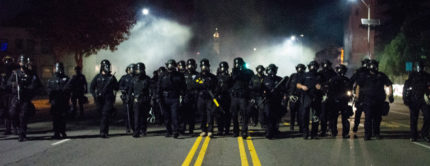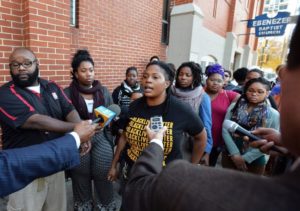
Atlanta Black Lives Matter activist and organizer Mary Hooks (center) speaks to the media on Nov. 24, 2014, outside Ebenezer Baptist Church in Atlanta, where she announced a peaceful rally at Underground Atlanta in response to developments in Ferguson, Mo., following a police officer’s fatal shooting of an unarmed black man. (BRANT SANDERLIN / [email protected])
This is not your parents’ or grandparents’ liberation movement. In a manner that was not present in the Civil Rights and Black Power movements, LGBTQ rights and leadership are front and center in #BlackLivesMatter. Of the three founders of the movement — Alicia Garza, Opal Tometi and Patrisse Cullors — two are Black lesbian activists.
However, for some Black activist groups, this poses a problem. Some, including Black nationalists and cultural nationalists, believe that the movement for Black liberation should place race first, and that LGBTQ issues have no place. And they disapprove of the intersectionality of race and sexual orientation that is promoted in the movement.
The division was brought to the fore in Atlanta, where a man named Sir Maejor Page was booted from the official local Black Lives Matter chapter — Black Lives Matter Atlanta — and formed his own nonprofit organization called Black Lives Matter of Greater Atlanta.
“They pushed the queer movement hard,” Sir Maejor said, as reported by the Atlanta Journal Constitution. “They were force feeding it down our throats. You can’t say that black lives matter and focus on something else. Your sexuality has nothing to do with black lives being killed in the streets.”
Atlanta Black Star attempted but was unable to reach Sir Maejor for comment.
For Mary Hooks — Co-Director of Southerners on New Ground (SONG) and a member of Black Lives Matter Atlanta — LGBTQ rights are important to the movement.
“It’s essential because if we want to be intentional about movement building, we have to be creating a movement that has hands large enough to hold all of us,” Hooks told Atlanta Black Star. “We have studied and learned the gaps that previous iterations of Black liberation movements have had regarding LGBTQ people. Bayard Rustin, who was a Black gay man that not only organized the March on Washington, but taught Dr. King about Ghandi’s non-violent methodology, yet was never honored and celebrated because of his sexuality.”
Hooks argues that although Black LGBTQ people always were part of the Black liberation movement, the issues and conditions they experience in America have been ignored historically.
“The mainstream white LGBTQ movement has never had an agenda that reflected the particular conditions of Black working-class LGBTQ people, even though we have always been a part of it. We can no longer fashion a vision of liberation that does not include LGBTQ people. We cannot build on the legacy of Black resistance without including the studs, femmes, dykes, queens, and the kids,” she said.
Ayo Kimathi, also known as Irritated Genie, is the leader of the Straight Black Pride Movement. And he is blunt about his opinions regarding the role of sexuality in Black liberation.
“Literally we will not have a Black movement if we don’t shut down and completely expose and resist this homosexual assault on the Black empowerment movement. There will be no Black empowerment movement,” Kimathi told Atlanta Black Star. “It will become a homosexual frenzy, where they will be teaching our children in the school this homosexuality, and there will be no Black traditional family value system. And that’s why Black Pride exists, because we realize if we don’t fight, this is not going to fight itself. Our movement is done.”
According to Kimathi, LGBTQ activists are infiltrating Black liberation organizations and keeping out groups such as Straight Black Pride in the U.S. and the UK, boycotting their events and forcing them out of venues.
“They actually have stated that [they] started the Black Lives Matter for the purpose of promoting – the term they used is — ‘queer the movement’ ” he said, adding that BLM members have said, “We don’t believe that the Black liberation movement can survive unless we queer the movement.”
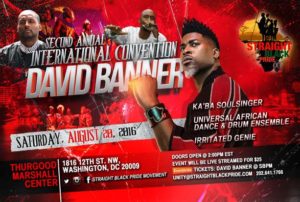
Straight Black Pride convention flyer featuring Ayo Kimathi and David Banner
“When we were launching our Straight Black Pride Movement last year, and we were doing it at the National Black Theater, all we did was put out a flyer saying a family day for our new movement launch, Straight Black Pride. We had no previous history, nothing of that nature. When we put that out on Facebook, we got attacked, and when we looked deeper into who was doing the attacking, a lot of them were part of Black Lives Matter movement, and what they did was they said that we don’t need no movement talking about being straight. And they were also saying this is in direct contradiction to our movement,” he noted. “That’s when we realized it was some kind of strange hostility, because it’s one thing to be promoting homosexuality, and it’s another thing to be trying to prevent other people who are trying to start a movement about Black families from doing it.”
The Straight Black Pride leader is concerned about the presence of wealthy interests outside the Black community funding Black Lives Matter, including George Soros and “a bunch of rich white, mostly so-called Jews who are financing the entire movement.”
“The Black Lives Matter movement has gotten push back from people who don’t understand why we have to talk about the unique conditions that LGBTQ Black people are having in this country,” Mary Hooks said. “Unfortunately, while the life expectancy rate of Black trans women is 35 years old, there are some people who want to gate keep who is worthy of safety, dignity and liberation. When we only look at the conditions of Black people based on race, we miss what is happening to not just LGBTQ Black people, but those who are working-class, formerly incarcerated, undocumented and or differently abled. We are stronger together, and the right-wing conservative forces in this country know it and they create and use divisive issues like LGBTQ rights or abortion access for women to fragment Black political power.”
Straight Black Pride also takes issue with the alliance between the Nation of Islam and Black Lives Matter. Cooperation between the two organizations was in place for the “Justice or Else!” event marking the 20th anniversary of the Million Man March.
“Those of us who are students of the Hon. Elijah Muhammad, we’re in love with our people. …We don’t ask you what your sexual preference is, we love you. We’re not your judges, we want to work together to free our people completely. So to my LGBTQ family, you’ll never find us condemning you for what has become of us in our sojourn (in America).”
“So we’re faced with a situation where it’s not just the white rich Jewish elites — that was similar to what happened in the civil rights struggle that took over and was trying to control the direction of Black leadership in Black movements during the Sixties — so we have that element. But now, we have potentially the strongest and longest existing relevant Black institution that is leveraging power and support for the pushing of the homosexual agenda by the Black Lives Matter movement,” Kimathi said. “Our agenda is Black self-empowerment. But they are completely definitively against Black self-empowerment, unless we put homosexuality on the forefront of the agenda.”
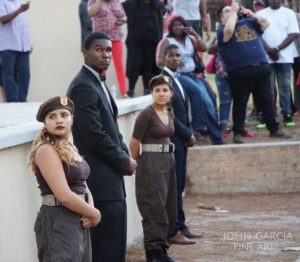
Latina women of the East Los Angeles Brown Berets, a civil rights organization, standing in formation with the Nation of Islam at a Black Lives Matter Los Angeles event (Photo: John Garcia)
Kimathi added that his organization intends to address the role of Black Lives Matter in the Black liberation movement at their upcoming convention on Aug. 20 in Washington, D.C.
Meanwhile, Ernest Owens — a multimedia journalist and editor for Philadelphia Magazine’s G Philly, who writes his column, “The Ernest Opinion” for Metro US — takes issue with Black nationalist critics of BLM.
“The Black community has LGBTQ individuals, so rights for that particular group should be fought for with the same rigor and passion as rights for heterosexual members within it would like theirs to be,” Owens told Atlanta Black Star. “Activists must not forget that it was Black LGBTQ individuals who were involved in the original formation of the BLM movement and such creators intended for its platform and mission to be intersectional. People who are not for intersectionality — causes that include the rights of women, working class, LGBTQ within the framework of overall Black empowerment and social justice — aren’t an accurate representation of what Black Lives Matter is about,” he added.
“Some of these homophobic and sexist individuals are truly Hoteps who are more invested in their self-righteous ideals of heteronormative oppression than progressive liberation for all Black people as a whole.”
This would not be the first time that a Black movement has experienced divisions over direction and philosophy. And yet, those rifts have been exploited in the past by the government, and those elements who have no interest in Black empowerment, as a means of bringing down those movements. What happens next remains to be seen.
“We are more certain that we need each other now more than ever. Our shared destiny depends on having a unified front. The Black Lives Matter movement is about the business of getting all Black people free,” Hooks maintains. “This movement belongs to anyone who is willing to put their eyes on the prize and their hand to the plow and who has the courage to fight like hell for all Black lives because we all must fulfill the mandate: To avenge the suffering of our ancestors, to earn the respect of future generations, and to be transformed on the service of the work.”
Editor’s note: The term “Hotep” used above is a disparaging term co-opted by intersectionalists who are intolerant of elements of the Black nationalist community, who believe in race first politics. The use of the term in this context also ignores the contribution of Imhotep, the African genius who the term has been used to honor for thousands of years.
